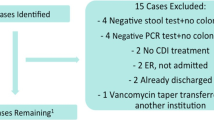Abstract
Background
Recurrent Clostridium difficile colitis (RCDC) is common, but data regarding recurrence rates and predisposing factors are sparse.
Methods
A retrospective case–control study was performed, identifying all inpatients and outpatients ≥18 years of age with C. difficile colitis (CDC) confirmed by a positive stool sample collected at our institution from January 2008 to August 2011. Factors associated with RCDC, the number of RCDC episodes, and the need for admission for RCDC were sought.
Results
A total of 739 patients (male, 47 %) were studied, of whom 527 (71 %) received inpatient treatment for their index episode of CDC. There was no difference (p = 0.53) between RCDC rates for inpatients (17.6 %) and outpatients (19.8 %). While severity score and albumin were associated with RCDC in our population, use of proton pump inhibitors (PPIs) correlated with decreased RCDC (p = 0.006) and decreased need for admission (p = 0.005). The addition of vancomycin to metronidazole therapy did not lower RCDC rates (p = 0.52) or decrease the need for admission (p = 0.78).
Conclusions
Hypoalbuminemia strongly correlated with higher recurrence rates, while PPI therapy actually reduced RCDC, representing previously underappreciated potential therapeutic targets for lowering CDC recurrence. The addition of vancomycin to metronidazole did not improve RCDC rates.
Similar content being viewed by others
References
Bartlett JG. Antibiotic-associated diarrhea. Clin Infect Dis. 1992;15:573–581.
McDonald LC, Owings M, Jernigan JB. Clostridium difficile infection in patients discharged from US short-stay hospitals, 1996–2003. Emerg Infect Dis. 2006;12:409–415.
Muto CA, Pokrywka M, Shutt K, Mendelsohn AB, Nouri K, Posey K, Roberts T, Croyle K, Krystofiak S, Patel-Brown S, Pasculle AW, Paterson DL, Saul M, Harrison LH. A large outbreak of Clostridium difficile-associated disease with an unexpected proportion of deaths and colectomies at a teaching hospital following increased fluoroquinolone use. InfectControl Hosp Epidemiol. 2005;26(3):273–280.
Rupnik M, Wilcox M, Gerding D. Clostridium difficile infection: new developments in epidemiology and pathogenesis. Nat Rev Microbiol. 2009;7:526–536.
Fekety R, McFarland LV, Surawicz CM, Greenberg RN, Elmer GW, Mulligan ME. Recurrent Clostridium difficile diarrhea: characteristics of and risk factors for patients enrolled in a prospective, randomized, double-blinded trial. Clin Infect Dis. 1997;24(3):324–333.
Barbut F, Richard A, Hamadi K, Chomette V, Burghoffer B, Petit JC. Epidemiology of recurrences or reinfections of Clostridium difficile-associated diarrhea. J Clin Microbiol. 2000;38(6):2386–2388.
McFarland L, Elmer G, Surawicz C. Breaking the cycle: treatment strategies for 163 cases of recurrent Clostridium difficile disease. Am J Gastroenterol. 2002;97:1769–1775.
Gerding DN. Treatment of Clostridium difficile-associated diarrhea and colitis. Curr Top Microbiol Immunol. 2000;250:127–139.
Arvand A, Moser V, Schwehn C, Bettge-Weller G, Hensgens MP, Kuijper EJ. High prevalence of Clostridium difficile colonization among nursing home residents in Hesse, Germany. PLoS One. 2012;7(1):e30183.
Burns DA, Heap JT, Minton NP. The diverse sporulation characteristics of Clostridium difficile clinical isolates are not associated with type. Anaerobe. 2010;16:618–622.
McDonald L, Kilgore G, Thompson A, Owens RC, Jr, Kazakova SV, Sambol SP, Johnson S, Gerding DN. An epidemic, toxin gene-variant strain of Clostridium difficile. N Engl J Med. 2005;353(23):2433–2441.
Weiss K. Clostridium difficile and fluoroquinolones: is there a link? Int J Antimicrob Agents. 2009;33:S1, S29-S32.
Yearsley KA, Gilby LJ, Ramadas AV, Kubiak EM, Fone DL, Allison MC. Proton pump inhibitor therapy is a risk factor for Clostridium difficile-associated diarrhoea. Aliment Pharmacol Ther. 2006;24(4):613–619.
Dial S, Alrasadi K, Manoukian C, Huang A, Menzies D. Risk of Clostridium difficile diarrhoea among hospital inpatients prescribed proton pump inhibitors: cohort and case–control studies. Can Med Assoc J. 2004;171(1):33–38.
U. S. Food and Drug Administration. Accessed on April 30, 2012; http://www.fda.gov/Safety/MedWatch/SafetyInformation/SafetyAlertsforHumanMedicalProducts/ucm290838.htm
Davies SM, Geppert J, McDonald KM, Romano PS, Shojania KG. AHRQ Technical Reviews, Report No. 01-0035.
Averill RF, Goldfield NI, Muldoon J, Steinbeck BA, Grant TM. A closer look at all-patient refined DRG’s. J AHMA 2002;73(1):46–50.
Kim YG, Graham DY, Jang BI. Proton pump inhibitor use and recurrent Clostridium difficile-associated disease: a case–control analysis matched by propensity score. J Clin Gastroenterol. 2012;46:397–400.
Shah S, Lewis A, Leopold D, Dunstan F, Woodhouse K. Gastric acid suppression does not promote clostridial diarrhea in the elderly. Q J Med. 2000;93(3):175–181.
Wilcox MH, Mooney L, Bendall R, Settle CD, Fawley WN. A case–control study of community-associated Clostridium difficile infection. J Antimicrob Chemother. 2008;62(2):388–396.
Khanna S, Pardi DS. The growing incidence and severity of Clostridium difficile infection in inpatient and outpatient settings. Expert Rev Gastroenterol Hepatol. 2010;4:409–416.
Cohen SH, Gerding DN, Johnson S, Kelly CP, Loo VG, McDonald LC, Pepin J, Wilcox MH. Clinical practice guidelines for Clostridium difficile infection in adults: 2010 update by the Society for Healthcare Epidemiology of America (SHEA) and the Infectious Diseases Society of America (IDSA). Infect Control Hosp Epidemiol. 2010;31(5):431–455.
Teasley DG, Gerding DN, Olson MM, Peterson LR, Gebhard RL, Schwartz MJ, Lee JT, Jr. Prospective randomized trial of metronidazole versus vancomycin for Clostridium difficile-associated diarrhea and colitis. Lancet. 1983;2(8348):1043–1046.
Wenisch C, Parshalk B, Hasenhundl M, Hirschl AM, Graninger W. Comparison of vancomycin, teicoplanin, metronidazole, and fusidic acid for the treatment of Clostridium difficile-associated diarrhea. Clin Infect Dis. 1996;22(5):813–818.
Louie TJ, Miller MA, Mullane KM, Weiss K, Lentnek A, Golan Y, Gorbach S, Sears P, Shue YK. Fidoxamicin versus vancomycin for Clostridium difficile infection. N Engl J Med. 2011;364(5):422–431.
Whitman CB, Czosnowski QA. Fidoxamicin for the treatment of Clostridium difficile infections. Ann Pharmacother. 2012;46:219–228.
Author information
Authors and Affiliations
Corresponding author
Rights and permissions
About this article
Cite this article
Rotramel, A., Poritz, L.S., Messaris, E. et al. PPI Therapy and Albumin are Better Predictors of Recurrent Clostridium difficile Colitis than Choice of Antibiotics. J Gastrointest Surg 16, 2267–2273 (2012). https://doi.org/10.1007/s11605-012-2037-9
Received:
Accepted:
Published:
Issue Date:
DOI: https://doi.org/10.1007/s11605-012-2037-9




